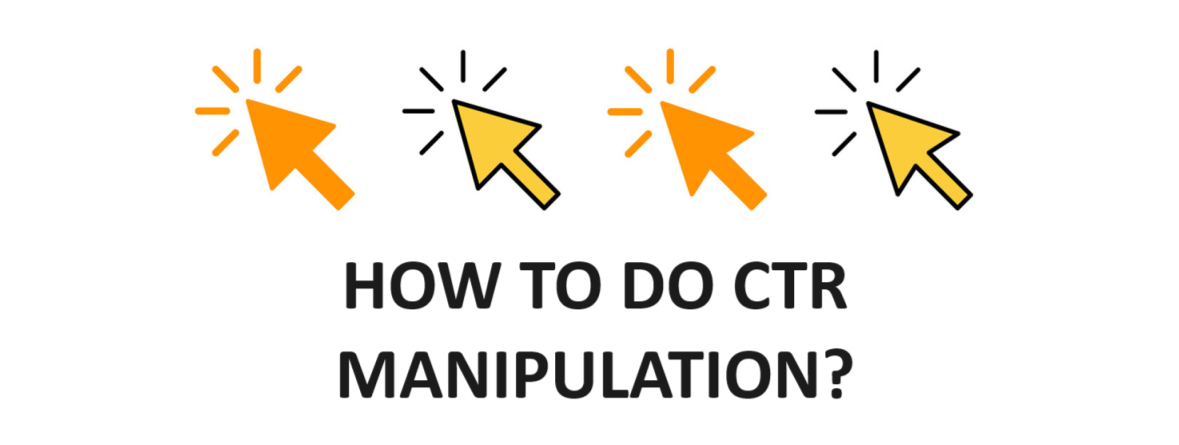The Impact of CTR Manipulation Solutions on Look Engine Algorithms
In the complex realm of search engine optimization, the introduction of CTR control solutions has stimulated a significant debate within the SEO area. As search engines continuously improve their formulas to supply individuals with the most relevant and qualified results, the practice of unnaturally pumping up click-through prices has actually raised brows and worries.

Rising Issues in SEO Area
The increasing frequency of click-through rate (CTR) control methods has stimulated expanding problems within the SEO area. As internet search engine progressively count on individual involvement metrics like CTR to identify the significance and authority of a webpage, the practice of unnaturally blowing up these metrics has actually increased moral and practical questions.
One significant issue is the potential distortion of search engine results triggered by CTR adjustment. Websites employing such tactics can trick search engine formulas right into ranking them greater than they should have, bring about a manipulated representation of one of the most pertinent and authoritative web content for customers. This manipulation threatens the integrity of internet search engine results, jeopardizing the individual experience and the reliability of online search engine.
Moreover, the intensifying use of CTR control solutions postures a threat to the level playing area that search engine optimization aims to develop. Smaller sized services or sites with limited resources might struggle to take on those participating in manipulative techniques, producing an unreasonable advantage for entities with the methods to manipulate such methods. Because of this, the search engine optimization community is calling for better openness, moral requirements, and algorithmic adjustments to fight CTR adjustment and support the stability of search engine outcomes.
Mechanisms of CTR Manipulation
Applying control over click-through prices (CTR) through misleading strategies has come to be a common method employed to manipulate search engine formulas. One system utilized for CTR manipulation involves making use of click ranches, where individuals or automated bots are paid to click on particular links repetitively. These fabricated clicks develop the illusion of high customer rate of interest, prompting search engines to rate the targeted page higher in search engine result.
An additional usual technique is the utilization of deceptive meta-information, such as incorrect title tags or meta descriptions, to attract clicks from individuals that may not discover the actual content relevant. By tricking individuals into clicking the link, manipulators can unnaturally inflate the CTR, bring about improved internet search engine positions.
Additionally, some experts engage in CTR control by participating in click exchange plans, where websites consent to click on each other's links to improve CTR artificially. This mutual clicking may not mirror genuine individual interest but can affect internet search engine algorithms, influencing the visibility of the entailed internet sites in search results page.
Discovery Challenges for Online Search Engine
Provided the sophisticated Find Out More techniques used by manipulators to artificially inflate click-through rates, online search engine encounter significant obstacles in precisely detecting instances of CTR adjustment. Manipulators commonly make use of methods such as click farms, click robots, and IP spoofing to imitate authentic customer behavior and deceive internet search engine formulas. These methods make it hard for search engines to separate between legit individual interactions and synthetically created clicks.
Additionally, manipulators continuously evolve their techniques to escape discovery, making it a continuous cat-and-mouse video game for internet search engine programmers. ctr manipulation service. The large quantity of information produced from individual interactions better makes complex the job of determining anomalies that may indicate CTR adjustment
Online search engine depend on complicated formulas and artificial intelligence designs to sort through vast amounts of data and detect patterns that suggest adjustment. As manipulators end up being much more sophisticated in their techniques, search engines need to constantly refine their detection methods to stay ahead of these destructive stars. Cooperation in between online search engine designers, cybersecurity experts, and industry stakeholders is essential in developing effective strategies to battle CTR manipulation and keep the stability of search engine outcomes.
Algorithmic Ramifications of CTR Manipulation
Comprehending how CTR adjustment impacts look engine formulas requires a deep dive right into the ins and outs of individual communication data evaluation. Online search engine count greatly on user actions signals, such as click-through rates (CTR), to examine the relevance and top quality of websites (ctr manipulation service). When CTR adjustment takes place, where synthetic clicks are generated to trick search engines, the algorithms that translate these signals can be misdirected
One trick algorithmic ramification of CTR adjustment is the possible skewing of organic search results. If controlled CTR information recommends that a certain website is much more prominent or pertinent than it in fact is, the search engine may rank it higher in search results page, causing a distortion of the natural ranking ecological community. This can be detrimental to both users, who may receive less relevant search results, and genuine sites that are pushed down in rankings unfairly.
Furthermore, online search engine algorithms are regularly progressing to deal with manipulative techniques. As internet search engine come to be more sophisticated in spotting CTR manipulation patterns, websites participated in such techniques might deal with charges, such as lower rankings and even elimination from search results page. Recognizing the algorithmic implications of CTR adjustment is vital for preserving the integrity and performance of search engine formulas.
Ethical Factors To Consider for Web Site Owners

Verdict
In verdict, the influence of CTR adjustment services on search engine algorithms is a subject of rising concern within the Search engine optimization neighborhood. The algorithmic effects of CTR control can skew search results and impact the overall honesty of search engine rankings.